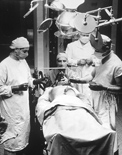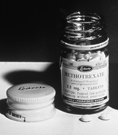DTP Branches and Offices
Milestone (1949)

Patient undergoing cancer surgery. Courtesy of NCI. 1949.

Sample methotrexate pill bottle. Courtesy of NCI.
Mechlorethamine, ethinyl estradiol, TEM, mercaptopurine, methotrexate, busulfan
It is clear that the development of better cancer treatments has improved the prognosis and quality of life for those who hear the words, “You have cancer.” During the early 1950s, the overall cure rate for cancer was 33%. In 1976, half of all cancer patients survived more than 5 years after diagnosis. In 2005, closer to two thirds are alive 5 years after they learn they have cancer.2
Prior to the 1950s, most cancers were treated with surgery and radiation. During the period 1949–1955, the only marketed drugs for the treatment of cancer were mechlorethamine (NSC 762), ethinyl estradiol (NSC 71423), triethylenemelamine (9706), mercaptopurine (NSC 755), methotrexate (NSC 740), and busulfan (NSC 750).
Paradoxically, the notion of using alkylating agents, such as mechlorethamine and busulfan, to treat cancers came about after seamen were exposed to mustard gas as a result of an explosion in the harbor of Bari, Italy, during World War II. The servicemen later developed marrow and lymphoid hypoplasia, giving researchers the idea of using nitrogen mustard analogs to treat lymphomas.
Nitrogen mustard compounds and other alklyating agents were among the first marketed drugs for treating cancer and are still widely used today for combating malignancies ranging from leukemias to solid tumors. Mechlorethamine is used mainly to treat Hodgkin disease and other lymphomas (MOPP regimen). Chlorambucil (NSC 3088) is used almost exclusively in the treatment of chronic lymphocytic leukemia and certain lymphomas. Melphalan (8806) has been used principally to treat multiple myeloma.1
The most commonly used alkylating agent is cyclophosphamide (NSC 26271), a particularly versatile alkylating agent used in the treatment of Hodgkin lymphoma, as well as other lymphomas, acute lymphocytic leukemia, and a variety of solid tumors. Unlike many of the nitrogen mustards, it can be administered in a variety of ways and dosages.1
1 University of Nebraska Medical Center. Cancer Chemotherapy Alkylating Agents.
2 National Cancer Institute. Mobilizing Resources to Eliminate Suffering and Death Due to Cancer.





